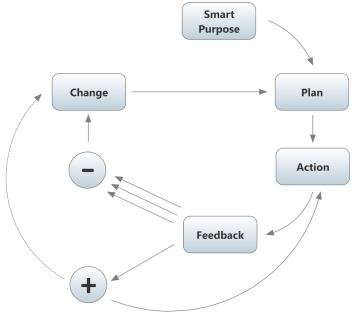If the Success Formula is So Simple, Why Isn't Everyone Doing It?
If the Success Formula is so Simple, Why Isn't Everyone Doing It?
The success formula is simple to understand. It consists of only five major ideas: Purpose, plan, action, feedback, change.
The success formula is a description and prescription for all successful, goal directed action, composed of only five parts:
- Decide your goal - Know your purpose.
- Formulate your best plan.
- Take decisive action.
- Gather and evaluate the feedback. Both the positive and the negative.
- Use the feedback to make progress by continually changing, adapting and evolving.
So, the obvious question is, If the success formula is so simple, why isn't everyone doing it?
Even though the success formula is simple, there are three elements of the success formula that most people don't much like.
Three out of the five elements of the success formula are not particularly attractive to the average human being. The three non-attractive elements of the success formula are:
- Set out a statement of a clear goal, or purpose.
- Suffer the negative feedback results, (Criticism, setback and defeats,)
- Change. Change and upgrade your current plans and actions. Keep improving on what you are currently doing.
Take a look at the success formula diagram and you will see that the success formula contains the above three items.

Question: Why would the average person be reticent about going public with a goal?
Why would a person NOT feel comfortable about announcing to his friends and family, "I am going to enter my name into that competition and I intend to win!".
Answer: Many people would be afraid to set a goal because they are afraid they would look foolish, or draw criticism if they fail to achieve the goal. The thought occurs to them, "What if I enter, and I end up coming in eighth or twelfth, or even in last place?" "What if I fail to come first? that means I would have failed. And I don't want to fail. So, the only way I can avoid that risk, is to not even enter. Not even set the goal in the first place."
The best and most efficient way to fail is to never even try in the first place. Many people are afraid to set goals. And that ensures they fail, because success means "the achievement of a goal". And you cannot achieve a goal you never set.
Feedback
The second element of the success formula that people hate, is the need to suffer the negative feedback; criticism, setback and defeats.
Most people love positive feedback. They love to hear compliments, praise and appreciation.
But most people hate the opposite. They hate criticism, they hate rejection and negative comments about their performance.
As a result of this dislike for negative feedback, the average person tends to avoid situations that may trigger negative feedback or personal criticism.
They try to avoid situations in which they may draw critical comments.

On the other hand, all champions, (people like you and me) are not overly put off by criticism, setbacks or defeats. They understand that the Success Formula creates negative feedback.
Happy people treat negative feedback as valuable information that needs to be analysed and the lessons learned.
Happy people treat negative comments as a school lesson. (You may have heard the phrase, "I attended the school of hard knocks").
If you want to be happy and successful, then you must cure yourself of the inability to handle criticism, setbacks and defeat.
If you want to be happier and more successful, then learn to harden-up a little. Become more resilient to setbacks and try to learn from them.
The way to do that is to finish the following sentence in the best way possible:
"I never see setbacks and criticism as permanent failure, but rather as ..." (complete with your personal ending).
Change
The third element of the success formula that the average person hates, is Change.
The success formula states that we need to continually "Change and upgrade our current plans and actions. Keep improving on what we are currently doing".
Change is not something that most people like.
In fact, most people hate change. They want things to "Stay the same; but get better".
If you want to live in accordance with the success formula, then you'll have to get your head around the concept of change.
The fact is that change is the only unchanging truth.
Prices change. Climates change. Moods change. The political economy is in a state of change. Nothing stays the same. So, the truth is that all success-orientated people need to be happy to make changes, and they need to NOT be psyched-out by change.
Are you a person who is psyched out by change?
Are you a person who is willing to make changes, (improvements) to your current plans and actions? Most people don't like change and that is why they don't like the five-part success formula.
To be happy and successful you need to embrace change. Learn to live and profit from the changing situation and live according to the elements of the five-part success formula.
Quiz: Change Management
Some people take change in their stride without breaking a sweat, others have more trouble.
Take our free Change Management questionnaire to see how well you are set up to deal with the pressure of change.
Definition: success formula
In business coaching, the success formula is a step-by-step process for reaching any goal. It starts with a clear purpose, builds a detailed plan, drives swift action, checks results through feedback, and uses that feedback to change and improve. Remove any step and the method stops working.
Show CG4D Definition
- Begins with a written purpose or goal
- Sets out a workable plan
- Demands prompt and decisive action
- Uses feedback to drive ongoing change and improvement
Article Summary
Success follows a clear five-step formula: set a goal, draft a plan, act, study feedback and adapt. People stall because goals expose them, criticism stings and change feels hard, yet those who welcome all three turn steady learning into real results.
Frequently Asked Questions
Here are some questions that frequently get asked about this topic during our training sessions.
What are the five parts of the success formula?
Why do many people avoid setting clear goals?
How can I handle fear of failure when goal setting?
What is the role of feedback in the success formula?
How do I turn criticism into useful feedback?
Why is change essential for personal growth?
How can I build resilience to setbacks and criticism?
Thought of something that's not been answered?
Did You Know: Key Statistics
PwC’s 2024 Global Workforce Hopes and Fears Survey finds that 56% of workers feel unclear about their personal goals at work, up from 45% in 2022. Gartner’s 2024 study on organisational change shows firms that run steady feedback loops are 32% more likely to hit change goals on time.Blogs by Email
Do you want to receive an email whenever we post a new blog? The blogs contain article 5-10 minutes long - ideal for reading during your coffee break!
Further Reading in Leadership and Management
-
What does it take to become a good leader?
Discover the seven leadership qualities that turn any manager into a good leader. Learn to take responsibility, set clear goals, motivate teams and drive eff .
Read Article > -
How to be a Better Leader
Learn how to be a better leader by mastering three leadership skills: clarity, rational decision making and positive motivation that inspire team performance.
Read Article > -
How Can Leaders Create Referent Power?
Learn how honest, collaborative, hard-working, decisive leaders with integrity gain referent power, boost team trust and drive higher performance. Act now.
Read Article > -
What is the Most Important Rule in People Management?
In people management, the actions you reward echo. Discover simple steps to end negative habits and boost employee motivation through reward and recognition.
Read Article > -
How to be a Positive Leader
Discover five positive leadership motivators-money, praise, achievement, team belonging and personal pride-to lift employee engagement and motivate staff daily.
Read Article >
Looking for Leadership and Management Training?
If you're looking to develop your Leadership and Management Skills, you may find this Leadership and Management Training Course beneficial:
Open Training Course Pricing and Availability
Next Open Course Starts in 7 days, Manchester City, places available







